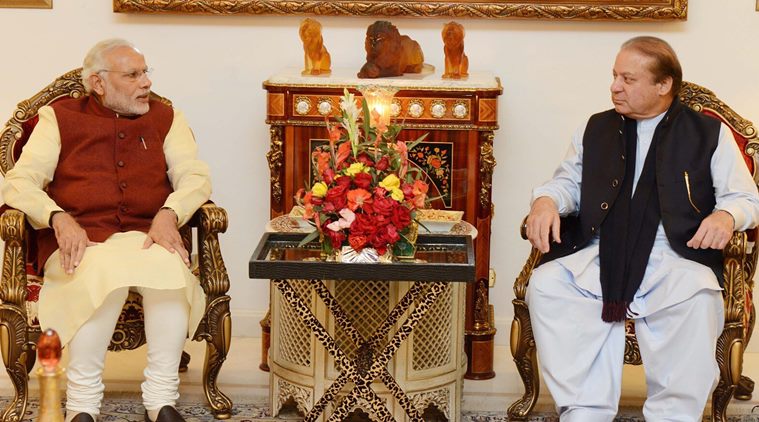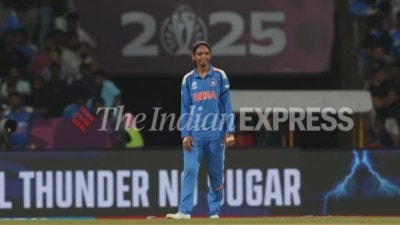India and Pakistan: Cold, colder and now a winter of some content
PM Modi’s Lahore visit, spontaneously decided while he was in Kabul or planned ahead, was the first by an Indian prime minister in nearly 12 years.
 Pakistan’s Prime Minister Nawaz Sharif, right, meets Indian counterpart Narendra Modi (Source: Press Information Department via AP)
Pakistan’s Prime Minister Nawaz Sharif, right, meets Indian counterpart Narendra Modi (Source: Press Information Department via AP)
Only one phrase really explains India’s relationship with its neighbourhood, even if thanks to Facebook, it is overused – it’s complicated.
This year has shown both the limits and the possibilities in India’s often troubled engagement with its neighbours. It also showed that while neighbours demand non-intervention by Delhi, they also look to Delhi to play a role, do ‘the right thing’. In the past 12 months, New Delhi mended one friendship, salvaged one more, lost a third, and is sort of unsure about yet another – Maldives, not Pakistan.
As for Pakistan, if it was not for the last month of surprise diplomatic moves led by Prime Minister Modi, 2015 would have been remembered as the year in which India lost the plot on Pakistan–and worse, lost the plot on Nepal too.
[related-post]
However, in the three weeks since the Paris climate conference where Modi and Pakistan’s Prime Minister Nawaz Sharif sat down side-by-side on a small sofa and spoke to each other in a hall full of people, the PM and his team have shown that imagination is not dead in Indian diplomacy.
As Modi jetted around the world, with no movement on the dialogue process with Pakistan, and the ‘unofficial’ blockade of Nepal, the promise of Modi’s initial outreach to SAARC nations through the symbolism of inviting them for his swearing-in ceremony in June 2014, looked as if it had faded. With Modi’s surprise stopover in Lahore, it is enjoying a winter revival.
It was General Pervez Musharraf (retired) as Pakistan’s President-cum-Army chief, who liked to spring surprise visits to Delhi. Perhaps no other Pakistani leader visited India as many times as he did–nor has any Indian leader visited Pakistan in a similar manner.
Modi’s Lahore visit, spontaneously decided while he was in Kabul or planned ahead, was the first by an Indian prime minister in nearly 12 years. The last one to go across was Atal Behari Vajpayee in January 2004. Manmohan Singh planned a visit in 2005 when it looked like an agreement on Siachen was in hand but when that fell through so did the visit.
South Block put out the word that an Indian Prime Minister’s visit was bound to be accompanied by high expectations, therefore Manmohan Singh would travel to Islamabad only to make a big ticket announcement. But whispers about several “low hanging fruit” were proved wrong. What Manmohan got instead was a bitter harvest, starting with the embassy attack in Kabul in July 2008, followed by the terrorist strike in Mumbai in November the same year. Though the Mumbai attack did not become an election issue in 2009, and the Congress came back with an emphatic victory, Manmohan Singh’s Project Peace with Pakistan was as good as shelved.
What Modi has shown is that prime ministerial visits need not be linked to announcements or agreements, that a visit to Pakistan by an Indian PM is a big ticket announcement in itself. A visit like this helps send out the message that the two sides are making serious efforts. Pakistan’s leaders have understood this better than the Indian side. Apart from Musharraf, even Prime Minister Yusuf Raza Gilani and President Asif Ali Zardari came to India in non-formal settings–Gilani for the World Cup cricket semi-final at Mohali, and Zardari on a pilgrimage to Ajmer. Modi has shown it is possible for Indian leaders to shed the straitjacket stitched for them by the MEA.
India-Pakistan relations are notoriously accident prone, and with plenty of people hoping, or actively plotting to send it down a cliff again, the challenge now is to insulate it from interrupters.
During External Affairs Minister Sushma Swaraj’s visit to Islamabad earlier this month, it was decided that the two sides will resume full spectrum talks, now to be known as the Comprehensive Dialogue (instead of Composite Dialogue, the name that it had from 2004 to 2008). The foreign secretaries are scheduled to meet on January 15 and 16 in Islamabad.
But three weeks is a long time in India-Pakistan relations.
Read part II: India and its neighbours: Something gained in Sri Lanka and Bangladesh, a lot lost in Nepal
- 01
- 02
- 03
- 04
- 05






































